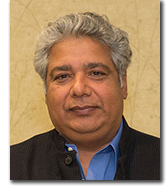
- professor of Sociology and Gerontology
- internationally recognized scholar of global health and medical sociology; received a 2017 Distinguished Scholar Award
- originally from Nepal
- teaches courses in medical sociology and global healthcare systems
- conducts social epidemiological research on indigenous populations in northeastern Nepal
Background
"As a child growing up in Nepal, which is a country located between India and China and home of Mt. Everest, I was interested in being an actor. Knowledge and curiosity always motivated me, and as I got older, I wanted to study and understand the social aspects of human life. I became particularly curious about the social sciences.
"I began by getting an undergraduate and master's degree in political science at Tribhuvan University in Kathmandu, Nepal. I came to the United States in Spring 1983 and attended Case Western Reserve University, where I completed my second master's degree, this time in medical anthropology. Finally, I completed my PhD in medical sociology at the University of Akron, giving me a lot of interdisciplinary training, all of which is important for my field.
"My career as a professor began at Indiana University South Bend, where I taught from 1988 to 1989. I then came to Miami in 1989, where I have been teaching for the past 28 years."
Teaching
"I predominantly teach medical sociology as well as a graduate level course called Global Healthcare Systems. I also teach Introduction to Sociology and the Sociology of Aging.
"Providing my students a realistic understanding of life is very important to me. We all need critical knowledge, but it has its own limitations. I give students practical, day-to-day life examples to help them understand what life, society, health systems, diseases are all about. I always tell them that practical knowledge is as important as critical knowledge: so you need experience, to see the world, to travel, and go abroad. Eat different food, mingle with different people, and develop compassion for all humanity. That's my philosophy as a teacher: I tell them to develop that compassion, look beyond their own race and identity, and focus on being a global citizen.
"Since 1992 I've taken students to Nepal for a 6-week summer study workshop called "Sociology of the Third World: Experience Nepal." One of these students, Jennifer Rothchild, wanted to be a physician and was planning to go to medical school. However, she participated in my program and decided she no longer wanted to be a physician but instead a sociologist.
"I remember one day after she graduated from Miami, she came to my office and asked me, "What can I do for you and Nepal?" I replied, "You don't need to do anything for me. If you think that the Nepal program has changed your life, then you can go and do something for Nepal." She took my advice, got both her master's and PhD in sociology, and returned to Nepal to do her doctoral research.
"Today Jennifer is a professor of sociology at the University of Minnesota at Morris. She also runs "Sam's House", which is one of the best orphanages in Nepal. The orphanage was built through her leadership by Miami University students (they're all my former students) and their families. Not only has Jennifer helped to create this orphanage, but she has also adopted a daughter from Nepal. This story always gives me a great joy and satisfaction."
Research
"I am a social epidemiologist. Social epidemiology is a discipline which basically studies social factors in the origin and distribution of diseases in specific populations. I have conducted most of my data collection in Nepal with a team of geneticists. Although I don't typically include students in my research, some interested students have participated.
"One of my earliest research projects studied parasitic infections in humans. Historically, parasitic infections have been believed to have been caused by social environmental characteristics. Our group basically identified a pair of genes which are responsible for this ailment, meaning that it is in fact genetically predisposed — although social factors do perpetuate it. If you are living in a contaminated environment, and if you are genetically predisposed, you're going to get this infection.
"Some of my other research projects have included Child Activities and Growth; Mental Health; Dental Morphology; Osteoarthritis and Osteoporosis; and Ocular Diseases.
"I was surprised when I was informed that I had received the 2017 Distinguished Scholar Award. I don't know who nominated me, but I was very happy and honored. Of course, there are many faculty members at Miami who are equally qualified. I never really think of these awards — you have to keep doing whatever you are doing, and hopefully someday you will be recognized."
Outside the Classroom
"For over 25 years, I have been a consultant to the Government of Nepal's Ministry of Health. In addition, I have also served as a consultant to Medical and Chiropractic Schools in the US and abroad.
"I love to go high-altitude trekking in different mountains. My lifetime trekking total is 4,200 kilometers! For example, I've trekked to the Base Camp of Mt. Everest 7 times. I love mountains, walking, swimming, and traveling the world."
[August 2017]
 Miami University Oxford, Ohio est. 1809
College of Arts and Science
Miami University Oxford, Ohio est. 1809
College of Arts and Science
 Miami University Oxford, Ohio est. 1809
College of Arts and Science
Miami University Oxford, Ohio est. 1809
College of Arts and Science